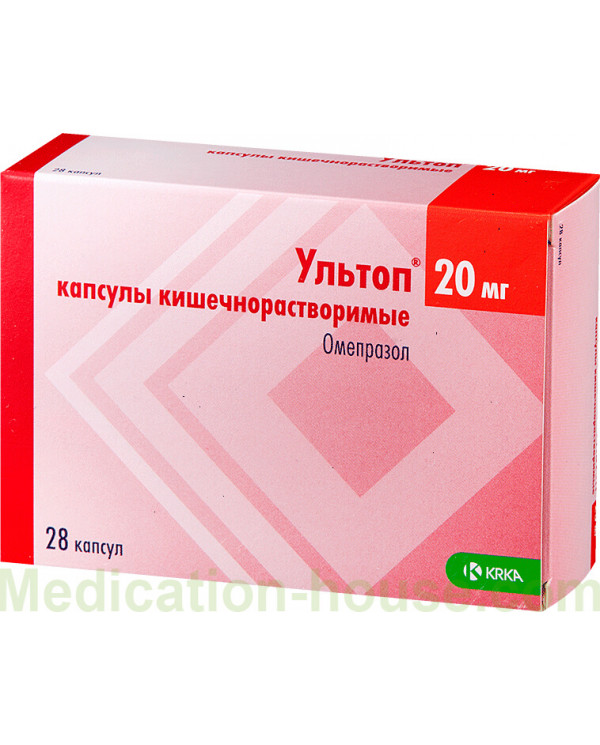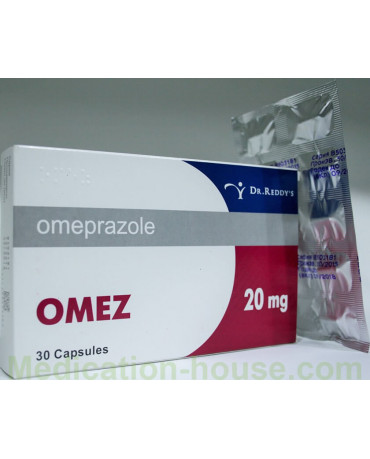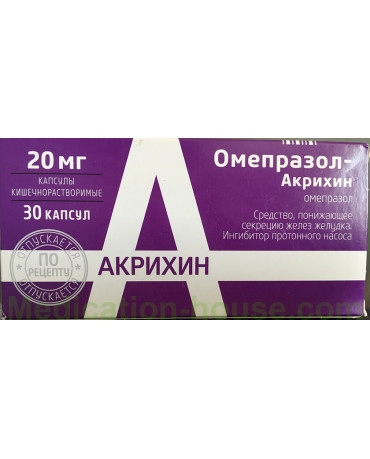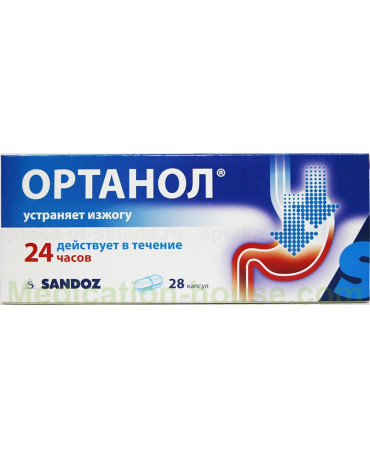Ultop instruction
You can buy Ultop here
Ultop is a proton pump inhibitor, a drug that lowers the secretion of gastric glands.
Release form and composition
Dosage forms:
enteric capsules: 40 mg each - with a brown-pink body and a light pink lid, 20 mg each - with a light pink body and a brown-pink lid, 10 mg each - with a light pink body and a white lid; contain pellets from white with a pink or yellow tint to white (7 pcs. in a blister, in a cardboard box 2 or 4 blisters; 14 or 28 pcs. in a polyethylene box with a propylene lid, in a cardboard box 1 box);
1 capsule contains:
active substance: omeprazole - 40 mg, 20 mg or 10 mg;
auxiliary components: sucrose, sugar crumbs (starch syrup, sucrose), corn starch, hyprolose, sodium lauryl sulfate, magnesium hydroxycarbonate (magnesium carbonate, heavy), macrogol 6000, 30% dispersion of a copolymer of methacrylic acid and ethyl acrylate (1: 1), titanium dioxide , talc;
composition of the capsule shell: titanium dioxide (E171), iron dye red oxide (E172), gelatin.
Indications for use
The use of Ultop in the form of a lyophilisate, capsules of 40 mg and 20 mg is indicated in the treatment of the following diseases:
peptic ulcer of the stomach and duodenum;
erosive and ulcerative lesions of the stomach and duodenum associated with Helicobacter pylori (as part of complex therapy with antibiotics);
erosive and ulcerative lesions of the stomach and duodenum, which arose against the background of the use of non-steroidal anti-inflammatory drugs (NSAIDs);
stress ulcers;
Zollinger-Ellison syndrome.
In addition, separate indications for each of the forms:
capsules 40 mg and 20 mg: gastroesophageal reflux disease (including its non-erosive forms and reflux esophagitis), other pathologies associated with increased gastric secretion;
Enteric capsules 10 mg:
non-ulcer dyspepsia - short-term therapy;
prevention of recurrence of gastric and duodenal ulcers, gastroesophageal reflux disease - in the form of long-term maintenance therapy.
Contraindications
breast-feeding;
childhood;
hypersensitivity to the components of Ultop.
With caution, Ultop should be prescribed for liver failure and any impaired renal function.
In addition, additional contraindications to the use of capsules:
period of pregnancy;
syndrome of glucose-galactose malabsorption, fructose intolerance, sucrase or isomaltase deficiency.
During pregnancy, the use of a lyophilisate is possible only in case of urgent need, if the benefits of therapy for the mother outweighs the potential threat to the fetus.
Method of administration and dosage
The capsules are taken orally before meals, swallowing whole and drinking plenty of water.
Recommended dosage:
exacerbation of duodenal ulcer: 20 mg per day, course of treatment - 2-4 weeks. With drug resistance, the daily dose can be increased to 40 mg;
exacerbation of gastric ulcer, erosive-ulcerative esophagitis: 20-40 mg per day, course duration - 4-8 weeks;
gastroesophageal reflux disease (GERD): with moderate inflammation - 20 mg per day (before breakfast) for 4-8 weeks. To achieve a sufficient therapeutic effect, it is possible to increase the daily dose to 40 mg. In case of recurrence of severe or resistant GERD, use of Ultop is extended by 4-8 weeks. Supportive therapy (after the healing of erosive esophagitis) is continued for 26–52 weeks; in severe esophagitis, capsules are taken for life;
Zollinger-Ellison syndrome, pathologies associated with increased gastric secretion: the initial dose is 60 mg per day. Then, as necessary, the daily dose is adjusted individually, taking into account the initial level of gastric secretion, increasing to 80-120 mg, while the dose is divided into 2-3 doses;
eradication of Helicobacter pylori: 20 mg 2 times a day in combination with antibacterial drugs for 7 or 14 days (depending on the therapy regimen);
non-ulcer dyspepsia: 10–20 mg once a day, the course of treatment is 2–4 weeks. In the absence of a clinical effect after 4 weeks of taking Ultop or the appearance of symptoms of dyspepsia soon after the completion of the course of taking the drug, it is necessary to clarify the diagnosis;
prevention of relapse of gastric ulcer and duodenal ulcer: 10–20 mg per day;
prevention of recurrence of GERD: maintenance therapy - 20 mg per day for a long (up to 52 weeks) period, or the use of Ultop as needed.
In case of impaired liver function, the daily dose should not exceed 10–20 mg due to increased bioavailability and clearance of omeprazole.
No dose adjustment is required in patients with impaired renal function and in the elderly.
Side effects
on the part of the digestive system: dry mouth, abdominal pain, nausea, vomiting, constipation, diarrhea, flatulence, stomatitis, impaired taste, a transient increase in the activity of liver enzymes; against the background of severe previous liver diseases - hepatitis, jaundice, liver dysfunction, hepatic encephalopathy;
on the part of the cardiovascular system: peripheral edema;
from the nervous system: headache, drowsiness, dizziness, paresthesia, agitation, insomnia, depression, hallucinations; with severe concomitant somatic pathologies or after a previous liver disease - encephalopathy;
from the musculoskeletal system: myalgia, muscle weakness, arthralgia;
from the hematopoietic system: thrombocytopenia, leukopenia, agranulocytosis, pancytopenia;
dermatological reactions: itching, rash; in some cases - alopecia, photosensitivity, multiforme (multiforme) exudative erythema;
allergic reactions: bronchospasm, urticaria, fever, angioedema, interstitial nephritis, anaphylactic shock;
from the senses: visual impairment;
from the genitourinary system: gynecomastia;
others: increased sweating; rarely - the formation of gastric glandular cysts.
In addition, additional side effects of Ultop, which may develop during the use of capsules:
from the digestive system: irritable bowel syndrome, heartburn, pancreatitis (including fulminant), loss of appetite, discoloration of stool, esophageal candidiasis, atrophy of the mucous membrane of the tongue, transient increase in the activity of liver enzymes and bilirubin in plasma;
from the nervous system: aggressiveness, apathy, nervousness, tremor, vertigo, confusion;
from the musculoskeletal system: bone pain (ossalgia), muscle cramps;
dermatological reactions: hair loss, petechiae, dry skin, Stevens-Johnson syndrome, epidermal necrosis;
from the side of the cardiovascular system: increased blood pressure, angina pectoris, bradycardia, tachycardia, palpitations, vasculitis;
from the genitourinary system: urinary tract infections, interstitial nephritis, microscopic pyuria, hematuria, proteinuria, glucosuria, testicular pain, increased serum creatinine;
from the hematopoietic system: anemia (including hemolytic anemia), neutropenia, leukocytosis;
from the respiratory system: cough, sore throat, profuse nosebleeds;
from the senses: unexpressed hearing impairment, ringing in the ears;
laboratory parameters: hyponatremia, hypoglycemia;
others: fever, back pain, general weakness, general fatigue, increased body weight.
Special instructions
It is possible to start using Ultop only after excluding the presence of malignant neoplasms, especially in patients with stomach ulcers, since drug treatment can mask symptoms and delay the diagnosis of a tumor.
The development of side effects with short-term therapy is rare, usually they are mild transient. In the event of the appearance of undesirable symptoms of pronounced action, taking Ultop should be discontinued.
The absorption of omeprazole is affected by food intake, so the capsules should be taken before meals.
In case of difficulty in swallowing the whole capsule, it is allowed to dissolve it in the mouth, or to swallow only the contents of the capsule. In addition, you can dissolve the contents of the capsule in a slightly acidified liquid (juice, yogurt) and drink it within 30 minutes.
During dialysis, the pharmacokinetic parameters of the active substance of Ultop do not change.
On the background of long-term therapy, the development of gastric glandular cysts is possible, the pathology is reversible, benign.
Therapeutic doses of Ultop do not affect the patient's ability to drive vehicles and mechanisms.
Drug interactions
Caffeine, theophylline, diclofenac, naproxen, piroxicam, metoprolol, propranolol, cyclosporine, lidocaine, ethanol, quinidine, estradiol do not change their concentration in blood plasma with the simultaneous long-term use of Ultop in a daily dose of 20 mg.
When combined with antacids, interaction has not been established.
Since omeprazole tends to increase the pH (acidity) of the stomach, when combined with ampicillin, iron salts, itraconazole, ketoconazole, it can reduce the absorption of their esters.
The action of Ultop can reduce the excretion and increase the concentration of diazepam, phenytoin, and indirect anticoagulants.
When taken simultaneously with clarithromycin, absorption is mutually reinforced.
Terms and conditions of storage
Keep out of the reach of children.
Store at temperatures up to 25 ° C, capsules - in a place protected from moisture, lyophilisate - in a dark place.
Shelf life: 10 mg capsules in blisters and lyophilisate - 2 years, capsules in pencil cases and 20 mg and 40 mg capsules in blisters - 3 years.
Terms of sell
You can buy Ultop without a prescription.




